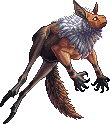Viewing U2CBA

Father: Unknown
Unknown Pedigree
Hardiness: 77
Appearance: 6
Emerged: 12:26 27.12.2024
Matured: 18:08 29.12.2024
Every year as winter approaches, troupes of Arba Brakumos migrate from more arid regions to the Kreskanta Tigo forests they use as breeding grounds. The young leaves and rich sapwood of the trees contain important nutrients for the development of their young, and Arba Brakumos carve a trail of fallen trees along their migration paths, allowing for new growth. Their strength is incredible; a fully grown Arba Brakumo is capable of tearing down a Kreskanta Tigo on their own. They do this by wrapping their arms around the trunk, digging their claws deep into the wood, and then ripping it apart. This strength is also used to fight off predators, and males will box with each other over females during mating season. Such fights can be quite dangerous and even deadly in some instances. Females are less prone to violence, and their camouflage coloration offers protection as they focus on raising their juveniles, known as joeys. A typical troupe consists of several females and their young, with a few orbiting males, though the size of such a group can vary greatly.
The creatures that dwell in this rather desolate world still display some diversity in appearance, eating habits, and social behavior. Whether they have fur or feathers, skin or scales, their unique genetic makeup allows for a variety of colors and markings within each species. Despite limitations in food sources, herbivores, omnivores, and carnivores are all present in the food chain, and each species requires specialized care within a laboratory. Although the artificial setting of housing units and breeding pods precludes most opportunities to study true interspecific behavior, the interactions within and between species has been studied extensively in the wilderness by scientists daring enough to venture beyond the outpost’s walls.
